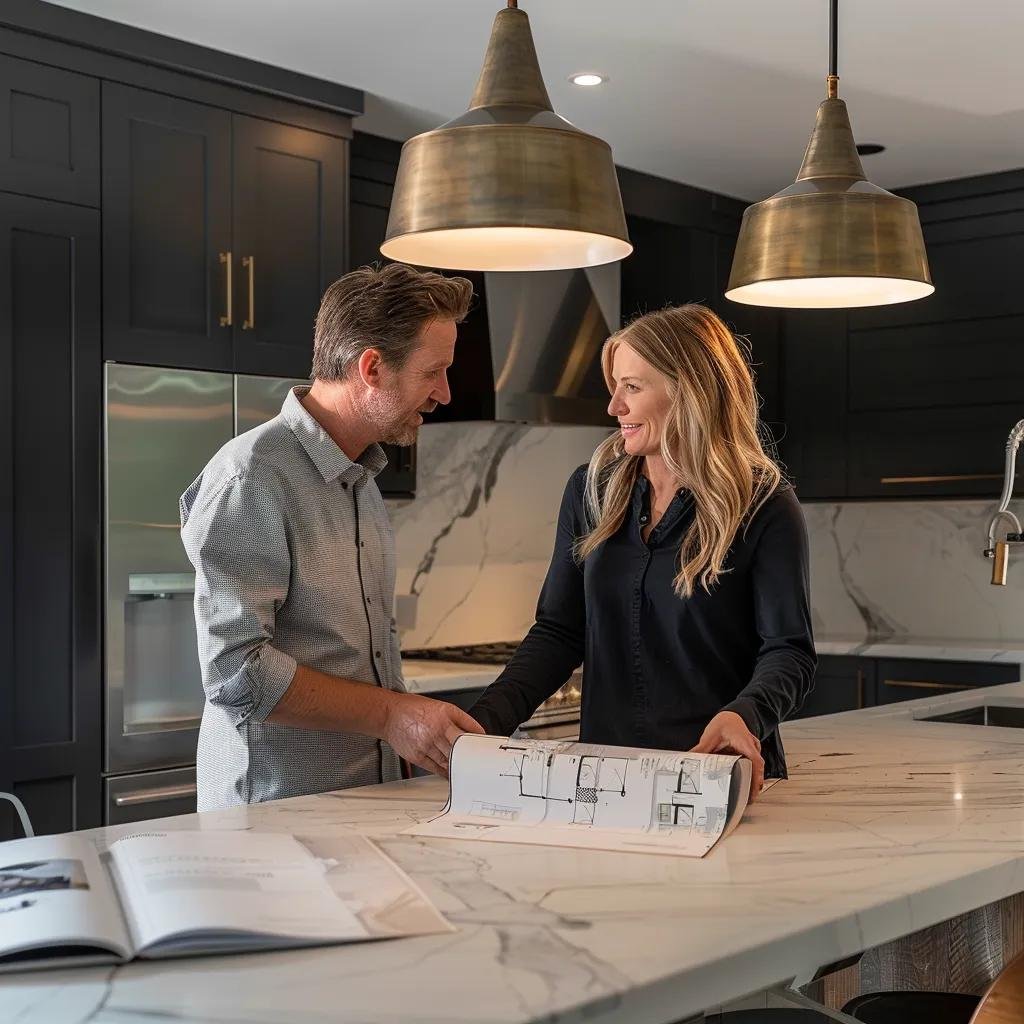Key Inquiries to Make When Hiring a Contractor
Embarking on a luxury remodel in the Washington D.C. area? Asking the right questions before hiring a contractor is crucial to safeguarding your investment and ensuring a seamless renovation journey. This guide will walk you through the key questions to ask a contractor before starting your renovation project, focusing on five critical areas: verifying credentials, planning and permits, understanding costs and contracts, ensuring clear communication, and avoiding scams. With ScanBuild LLC’s expertise in luxury kitchen, bathroom, and flooring renovations, you’ll be equipped to protect your vision, budget, and peace of mind from the very start.
How Can I Verify a Contractor’s Credentials and Experience?
Confirming a contractor’s credentials involves checking licenses, insurance, and past work to minimize liability, ensure code compliance, and guarantee quality craftsmanship. Establishing this foundation builds trust and aligns your expectations with professional standards before design and construction begin.
What Licenses and Insurance Should a Contractor Have?
A licensed and insured contractor provides essential legal and financial safeguards, protecting homeowners from liability.
- A valid state contractor license demonstrating compliance with D.C. regulations.
- General liability insurance covering property damage and bodily injury.
- Worker’s compensation insurance protecting against on-site accidents.
- Professional certifications (e.g., NARI accreditation) signaling specialized expertise.
Ensuring these credentials secures both compliance and homeowner protection before work begins.
Contractor Licensing and Insurance
Contractors must possess valid licenses and insurance to operate legally, ensuring they meet specific standards and protect homeowners from potential liabilities. These credentials demonstrate compliance with local regulations and provide financial safeguards against property damage, bodily injury, and on-site accidents.
District of Columbia Department of Consumer and Regulatory Affairs
This supports the article’s emphasis on verifying a contractor’s credentials as a crucial step in the renovation process.
How Can I Assess a Contractor’s Portfolio and Specializations?

Evaluating past projects reveals a contractor’s mastery of luxury materials, custom designs, and high-end finishes. Reviewing projects similar to your kitchen, bathroom, or flooring scope confirms their ability to deliver refined results.
Reviewing diverse completed projects confirms expertise in luxury finishes and custom design.
How Do I Check Contractor References and Reviews?
Contacting previous clients and online reviewers verifies reliability, communication, and workmanship.
- Reach out to at least three recent homeowners for candid feedback.
- Ask for project details: timeline adherence, budget management, site cleanliness.
- Read online ratings to identify patterns in punctuality and quality.
Validating references and reviews builds confidence in your contractor’s reputation and service.
What Should I Know About Project Planning and Permits?
Effective planning and permit management define scope, budget, and timeline accuracy. Clarifying these elements with your contractor prevents surprises and ensures legal compliance throughout your renovation.
How Do I Discuss Project Scope and Design with My Contractor?
Defining scope and design early aligns your vision and avoids scope creep. Share inspiration images, material selections, and desired functionality to create a clear design brief. Establishing milestones for design approval, material procurement, and construction phases streamlines decision-making and keeps the project on track.
What Permits and Building Codes Apply in Washington D.C.?
Navigating D.C. regulations requires specific permits and inspections.
Permitting and Building Codes in Washington D.C.
Navigating the permit process and adhering to building codes are essential for legal compliance and protecting your investment. Different permits are required from various agencies within Washington D.C., each with specific requirements to ensure structural integrity, electrical safety, and adherence to historic preservation guidelines.
DCRA Building Permit Office
This citation reinforces the importance of understanding and complying with local regulations, as highlighted in the article.
Securing proper permits and adhering to local codes protects your investment and community.
How Is the Project Timeline Established and Managed?
A realistic timeline balances design, permitting, and construction. Your contractor should outline milestones—design approval, permitting, demolition, installation, and final walkthrough—and update you weekly on progress. This disciplined schedule enhances predictability and accountability as work unfolds.
How Do I Understand Renovation Costs and Contract Terms?
Clear cost estimates and a detailed contract prevent budget overruns and disputes. Understanding how estimates are built, payment schedules structured, and contractual terms framed empowers you to negotiate confidently.
What Should I Expect in a Renovation Estimate and Budget?
An accurate estimate breaks down labor, materials, permits, and contingencies. It should specify allowances for high-end fixtures, custom finishes, and unexpected conditions. A transparent budget summary highlights line-item costs and a contingency reserve, ensuring you know where every dollar is allocated.
How Are Payment Schedules and Deposits Typically Structured?
Payment schedules balance contractor cash flow with homeowner protection.
- Initial Deposit (10–15%) to reserve your project slot.
- Progress Payments (50–60%) tied to completion of key milestones.
- Final Retainage (10–20%) held until punch-list items are resolved.
This structure encourages timely work while safeguarding your funds until satisfactory completion.
What Key Clauses Should I Look for in a Renovation Contract?
A comprehensive contract outlines obligations, protecting both parties.
Reviewing these clauses secures clear expectations and recourse options.
How Can I Ensure Clear Communication and Manage Expectations?
Open, consistent communication fosters collaboration and reduces misunderstandings. Establishing protocols and addressing changes promptly keeps your renovation aligned with your vision.
What Communication Protocols Should I Establish with My Contractor?
Agree on preferred channels—email, phone, text—and update frequency. Weekly site meetings and digital progress reports promote transparency. Documenting decisions and approvals in writing ensures a shared record of choices and responsibilities.
How Are Unexpected Issues and Change Orders Handled?
Unexpected conditions are inevitable. A formal change order process should specify cost estimates, schedule impacts, and written approvals before work proceeds. This systematic approach maintains control over budget and timeline adjustments.
What Post-Completion Support and Warranties Are Provided?
Reliable contractors offer warranties on labor and materials. Confirm warranty duration—for example, one year on workmanship and manufacturer warranties on fixtures—and understand the process for requesting service. Post-completion support ensures your remodel remains pristine and functional.
What Are the Red Flags and How Do I Avoid Contractor Scams?

Recognizing warning signs early protects you from unqualified or fraudulent contractors. By conducting thorough vetting and maintaining oversight, you can minimize risk and safeguard your renovation investment.
What Are Common Warning Signs of an Unreliable Contractor?
Unreliable contractors often exhibit these indicators:
- Lack of proper licensing or insurance documents.
- Cash-only payment requests or large upfront deposits above local norms.
- No written contract or reluctance to formalize terms.
Identifying these red flags prevents costly mistakes and delays.
How Can I Protect Myself from Renovation Scams?
Due diligence and clear agreements protect homeowners from scams:
- Verify credentials with DCRA and insurance providers.
- Insist on a signed contract outlining all details.
- Use escrow or milestone-based payments rather than lump-sum up front.
These practices ensure accountability and financial security.
By asking targeted questions about credentials, planning, costs, communication, and red flags, you position yourself for a successful luxury renovation. Partnering with a reputable contractor like ScanBuild LLC maximizes quality, transparency, and satisfaction from concept to completion.


Recent Comments